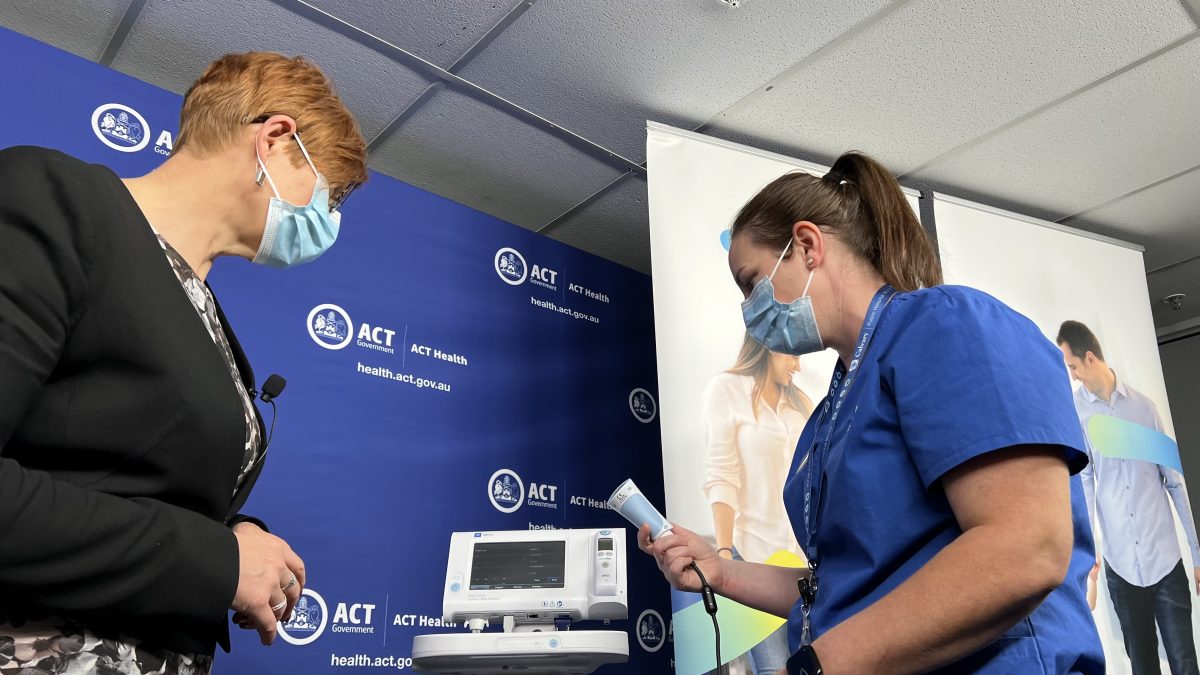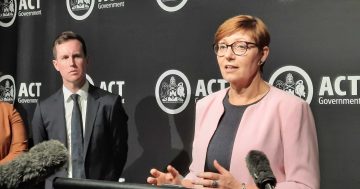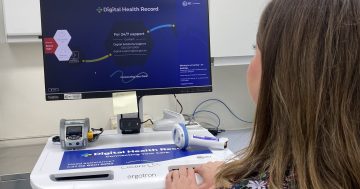
Health Minister Rachel Stephen-Smith said the digital health record had to be rolled out in order to address the already-identified data reporting issues. Photo: Lottie Twyford.
Shadow Health Minister Leanne Castley has panned explanations given by the ACT Government as to why it insisted on going ahead with rolling out the Digital Health Record (DHR) despite known issues around external reporting.
Ms Castley previously called on the Auditor-General to investigate the entire project in light of documents showing the project’s data reporting had been a “red risk”.
She pushed for a further explanation during budget estimates hearings but found the answers she received wanting.
“CHS [Canberra Health Services] CEO Dave Peffer stated that in Queensland the DHR equivalent began with a single hospital, the state continued to report, they then resolved their reporting issues and then scaled uptake across the various hospitals,” Ms Castley said.
“In Victoria, they rolled out the equivalent Epic product within one health district, with the balance of the state still able to report on health services.”
Ms Castley questioned why the government insisted on rolling out the program on such a large scale, rather than taking a more measured approach like other jurisdictions.
“This simply beggars belief,” she said.
During questioning Health Minister Rachel Stephen-Smith said the entire project team and herself had been aware there would be issues with data reporting before the DHR went live.
The external data collecting is needed for national funding submissions to the Commonwealth.
Those submissions aren’t due until September, with the data required to be updated again in November.
“Some of the data challenges that we have faced post-go-live are more substantial than I had understood pre-go-live … I think frankly it’s also fair to say that there were some people in the data teams who were telling us we were going to have more challenges with data than we had understood,” Ms Stephen-Smith told the hearing.
“There were some people in the frontline data teams who were expressing concerns around how long it would take to get to a point where we had very robust data for reporting.
“I think some of the concerns we not being escalated appropriately through to the project board, if I’m being really frank about it.”
However, it was argued delaying the program further would have cost taxpayers hundreds of thousands of dollars, and wouldn’t have made much of a difference anyway.
Ms Stephen-Smith explained the program had to go live for the full issues with the data collecting to be realised.
“We knew it was an issue, we knew it was going to take time to resolve, we knew we had time to resolve it in terms of the national reporting timelines, but I think the extent of the challenge was probably something that was better understood on the frontline than it was by me at the time of go live,” she said.
“We also knew many of those challenges could not be resolved prior to go-live, that we actually had to go live in order to address those challenges.”
Mr Peffer further explained data reporting capabilities were currently possible, just not to the level of accuracy needed for national submissions.
He also said some of the issues were around how people were entering data from the front end.
As more than 40,000 staff across 40 different reporting systems had to be trained in how to use the new system, Mr Peffer said teams were constantly checking the data to see if it matched with what was actually happening on the ground.
“If we worked on this for a further 12 months and then went live, we would have had the same issue,” he said.
“We have to observe how people were using the system … because it’s a human thing.
“Time is a factor but it doesn’t resolve the issue, it’s not something that you could simply work on for an extra month and then everything’s perfect, it doesn’t work that way.”
As for the data needed for national submissions, a discrepancy of even 1 to 2 per cent can result in a funding miscalculation of millions of dollars.
“At this point in time we do have our own internal data that we use against the indicators … but as I said accuracy is important when we’re reporting publicly, particularly when it’s going to various Commonwealth regulatory agencies,” Mr Peffer said.
Ms Stephen-Smith reasoned while the external data reporting was an issue, overall the risk was worth the positive outcomes the program had already delivered and the benefits still to come.
“Ultimately we’re going to end up with a system where we’re going to have much better, much more robust, and much more comprehensive data sets that we’re going to be able to report publicly on more frequently,” she said.





















